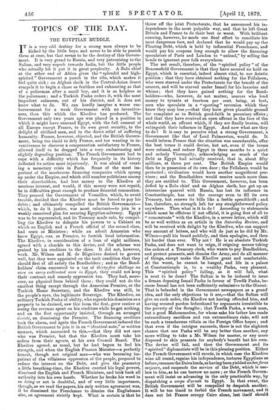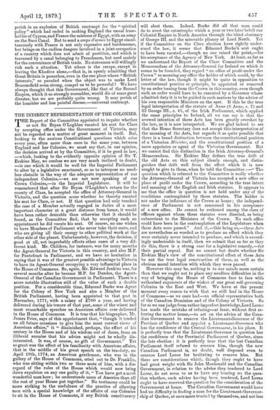TOPICS OF THE DAY.
THE EGYPTIAN MUDDLE.
IT is a very odd destiny for a strong man always to be kicked by the little boys, and never to be able to punish them at once, but that seems to be the destiny of this Govern- ment. It is very grand to Russia, and very patronising to the Sultan, and very superb towards India, but the little people who actually hit it put it in great perplexity. A Zulu chief at the other end of Africa gives the "splendid and high- spirited" Government a punch in the ribs, which makes it feel quite sick ; an Afghan sheik in the Central-Asian desert compels it to begin a chase as fruitless and exhausting as that of a policeman after a small boy, and it is as helpless as the policeman ; and a Turkish Pasha orders it, with the most impudent calmness, out of his district, and it does not know what to do. We can hardly imagine a worse em- barrassment for a weak Government with no inventive- ness, than this which the Khedive has produced. The Government only two years ago was placed in a position in which it might have annexed Egypt, with the full consent of all Europe except France, to its own great security, to the delight of civilised men, and to the direct relief of suffering humanity. France, however, objected, and the British Govern- ment, being too timid to defy France, and too wanting in in- ventiveness to discover a compensation satisfactory to France, allowed itself to be dragged into a very embarrassing and slightly degrading position. The French Government had to cope with a difficulty which has frequently in its history deflected its action most injuriously. It was afraid of creat- ing a monetary crisis in Paris. Some of the most im- portant of the mushroom financing companies which sprang up under the Empire, and which still number politicians among their shareholders, had lent money to the Khedive at usurious interest, and would, if this money were not repaid, be in difficulties great enough to produce financial commotion. They pressed the Government of Versailles, which, to avoid trouble, decided that the Khedive must be forced to pay his debts ; and ultimately compelled the British Government— which, to do it justice, was most reluctant—to join in a weakly conceived plan for securing Egyptian solvency. Egypt was to be regenerated, and its Treasury made safe, by compel- ling the Khedive to delegate his powers to a Cabinet on which an English and a French official of the second class, had seats as Ministers ; while an adroit Armenian who knew Egypt, was, as Premier, to furnish local information. The Khedive, in consideration of a loan of eight millions, agreed with a chuckle to this device, and the scheme was praised by his creditors to the skies. It did not, however, work. Mr. Wilson and M. de Blignieres desired to govern well, but they were appointed on the tacit condition that they should first of all satisfy the Bondholders ; and as the Bond- holders' claim amounted to a tax of thirty-five shillings an acre on every cultivated acre in Egypt, they could not keep their contract and remedy oppression too. They had, more- over, no physical force behind them ; they could not do the smallest thing except through the Armenian Premier, or the Turkish Home Secretary, and the Khedive was still, in the people's eyes, the legitimate Sovereign. The Khedive, an ordinary Turkish Pasha of ability, who regards his dominion as a property to be drained, saw this from the first, grew restive at seeing the revenue spent on his creditors while he got nothing, and on the first opportunity insisted, through an arranged eineute, on dismissing the Premier. The financing creditors took the alarm, and again the French Government induced the British Government to join it in an "identical note," or written menace, which amounted to this,—that they did not care who was Premier, but that the Khedive must take his orders from their agents, at his own Council Board. The Khedive agreed, as usual, but he had begun to feel his strength, and when the English Finance Minister—a perfectly honest, though not original man—who was becoming im- patient of the villainous oppression of the people, proposed to reduce the interest on the Debt, and give the peasantry a little breathing-time, the Khedive exerted his legal powers, dismissed the English and French Ministers, and took back all authority into his own hands. Whether he broke his word in so doing or not is doubtful, and of very little importance, though, as we read the papers, his only written agreement was, if he dismissed the Frenchman to dismiss the Englishman also, an agreement strictly kept. What is certain is that he threw off the joint Protectorate, that he announced his in- dependence in the most palpable way, and that he left Great Britain and France to do their best or worst. With brilliant cunning, however, he made one final effort to conciliate his most dangerous foes, and declared that he would pay up the. Floating Debt, which is held by influential Frenchmen, and would pay his coupons long enough to allow the financing speculators of Paris and London to "unload," by selling the bonds to ignorant poor folk everywhere.
The net result, therefore, of the "spirited policy" of the. Beaconsfield Government is that they have secured no hold on Egypt, which is essential, indeed almost vital, to our Asiatic. position ; that they have obtained nothing for the Fellaheen, who were starved under the Protectorate for the benefit of the usurers, and will be starved under Ismail for his luxuries and. whims ; that they have gained nothing for the Bond- holders—who, however, do not matter, usurers who lend money to tyrants at fourteen per cent. being, at best, men who speculate in a " sporting " reversion which they know they may lose ;—that they have given plausible ground for complaint as to British good-faith in pecuniary affairs ; and that they have received an open affront in the face of the whole world, an affront which, if they are finally beaten, will extinguish their influence in Egypt. And now what are they to do ? It is easy to perceive what a strong Government, a. Government like that of Lord Palmerston, would do. It would inform France that the situation was unendurable, offer the best terms it could, devise, but act, even if the terms were refused, and reduce Egypt in three months to a quiet and orderly Viceroyalty, acknowledging so much of the Debt as Egypt had actually received, that is, about fifty millions, at three per cent. The British Empire would. then be in possession of its own door ; the Fellaheen would be protected ; civilisation would have another magnificent pro- vince; and the Bondholders would receive much more than they are entitled to. This Government, however, has been. defied by a Zulu chief and an Afghan sheik, has got up an internecine quarrel with Russia, has lost its influence in Constantinople, has not the courage even to fill its own Treasury, but renews its bills like a feeble spendthrift ; and. has, therefore, no strength left for any straightforward policy, anywhere. Then what is it to do ? According to statements which must be officious if not official, it is going first of all to "remonstrate" with the Khedive, in a severe letter, which wilI be as well written as an article in the Saturday Review, and will be received with delight by the Khedive, who can support any amount of letters, and who will do just as he did by Mr. Wilson—pull his beard publicly, and then apologise, and then hit harder than ever. Why not ? He is an absolute Turkish Pasha, and does not want to reign, if reigning means taking the orders of a Treasury clerk, who wants to pay Bondholders, and protect peasants, and dismiss the Army, and do all manner of things, except make the Khedive great and comfortable. At the worst, he cannot be hanged, and life in a palace at Constantinople is, to a wealthy Pasha, very pleasant. This "spirited policy" failing, as it will fail, what is next to be done? The Sultan is to be induced to issue a firman deposing Ismail Pasha in favour of Tewfik Pasha, be- cause Ismail has not been sufficiently submissive to the Giaour. That is belauded in the Government newspapers as a grand idea, and the only objections to it are,—that the Sultan will give no such order, the Khedive not having offended him, and having secured pardon beforehand by arguments irresistible to the poverty of the Seraglio ; that Tewfik Pasha, a weak man, but a good Mahommedan, for whose sake his father has made extraordinary sacrifices and run extraordinary risks, will not be such a treacherous villain as the Foreign Office hopes ; and that even if the intrigue succeeds, there is not the slightest chance that one Pasha will be any better than another, any more willing to take a Mr. Wilson for master, or any more disposed to skin peasants for anybody's benefit laut his own. The device will fail, and then the Government and its "spirited" diplomatists will be in this pleasing position. Either the French Government will recede, in which case the Khedive wins all round, regains his independence, tortures Egyptians as before, resumes the Daira lands, as having been yielded undertone majeure, and suspends the service of the Debt, which is use- less to him, as he can borrow no more ; or the French Govern- ment will insist on advancing in the only practicable way, by dispatching a corps d'armie to Egypt. In that event, the British Government will be compelled to despatch another. It will be too timid to forbid the French movement, and it dare not let Franca occupy Cairo alone, lest itself should perish in an explosion of British contempt for the "spirited policy" which had ended in making England the vassal lease- holder of Cyprus, and France the mistress of Egypt, with an army on the Suez Canal. But to send a corps d'artnee to Egypt simul- taneously with France is not only expensive and burdensome, but brings on the endless dangers involved in a joint occupation of a country which does not admit of partition, and which is traversed by a canal belonging to Frenchmen, but used mainly for the convenience of British trade. No statesman will willingly risk such a situation. Yet where is the escape, except in leaving the Khedive alone,—that is, in openly admitting that Great Britain is powerless, even in the one place where "British interests," so paraded when the object was to make Lord Beaconsfield seem strong, compel us to be powerful ? We have always thought that this Government, like that of the Second Empire, which it so strongly resembles, would die of some great disaster, but we are probably quite wrong. It may perish of the humbler and less painful disease,—universal contempt.



































 Previous page
Previous page